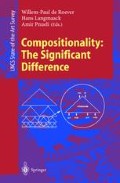Abstract
A compositional method is presented for the verification of multi-agent systems. The advantages of the method are the well-structuredness of the proofs and the reusability of parts of these proofs in relation to reuse of components. The method is illustrated for an example multi-agent system, consisting of co-operative information gathering agents. This application of the verification method results in a formal analysis of pro-activeness and reactiveness of agents.
Access this chapter
Tax calculation will be finalised at checkout
Purchases are for personal use only
Preview
Unable to display preview. Download preview PDF.
References
Abadi, M. and L. Lamport (1993). Composing Specifications, ACM Transactions on Programming Languages and Systems, Vol. 15, No. 1, p. 73–132.
Benjamins, R., Fensel, D., Straatman, R. (1996). Assumptions of problem-solving methods and their role in knowledge engineering. In: W. Wahlster (ed.), Proceedings of the 12th European Conference on AI, ECAI’96, John Wiley and Sons, pp. 408–412.
Brazier, F.M.T., Dunin-Keplicz, B., Jennings, N.R. and Treur, J. (1995). Formal specification of Multi-Agent Systems: a real-world case. In: V. Lesser (ed.), Proceedings of the First International Conference on Multi-Agent Systems, ICMAS-95, MIT Press, Cambridge, MA, pp. 25–32. Extended version in: InternationalJournal of Cooperative Information Systems, M. Huhns, M. Singh, (Eds.), special issue on Formal Methods in Cooperative Information Systems: Multi-Agent Systems, vol. 6, 1997, pp. 67–94.
Brazier, F.M.T., Treur, J., Wijngaards, N.J.E. and Willems, M. (1996). Temporal semantics of complex reasoning tasks. In: B.R. Gaines, M.A. Musen (eds.), Proceedings of the 10th Banff Knowledge Acquisition for Knowledge-based Systems workshop, KAW’96, Calgary: SRDG Publications, Department of Computer Science, University of Calgary, pp. 15/1–15/17. Extended version to appear in Data and Knowledge Engineering, 1998
Cornelissen, F., Jonker, C.M., Treur, J. (1997). Compositional verification of knowledge-based systems: a case study in diagnostic reasoning. In: E. Plaza, R. Benjamins (eds.), Knowledge Acquisition, Modelling and Management, Proc. of the 10th EKAW, Lecture Notes in AI, vol. 1319, Springer Verlag, pp. 65–80. Extended abstract in: Proceedings of the Fourth European Symposium on the Validation and Verification of Knowledge-based Systems, EUROVAV’97.
Dams, D., Gerth, R., Kelb, P. (1996). Practical Symbolic Model Checking of the full m-calculus using Compositional Abstractions. Report, Eindhoven University of Technology, Department of Mathematics and Computer Science.
Engelfriet, J., Jonker, C.M., Treur, J., (1997). Compositional Verification of Knowledge-based Systems in Temporal Epistemic Logic. In: A. Bossi (ed.), Proceedings of the ILPS’97 Workshop on Verification.
Fensel, D. (1995). Assumptions and limitations of a problem solving method: a case study. In: B.R. Gaines, M.A. Musen (eds.), Proceedings of the 9th Banff Knowledge Acquisition for Knowledge-based Systems workshop, KAW’95, Calgary: SRDG Publications, Department of Computer Science, University of Calgary.
Fensel, D., Benjamins, R. (1996). Assumptions in model-based diagnosis. In: B.R. Gaines, M.A. Musen (eds.), Proceedings of the 10th Banff Knowledge Acquisition for Knowledge-based Systems workshop, KAW’96, Calgary: SRDG Publications, Department of Computer Science, University of Calgary, pp. 5/1–5/18.
Fensel, D., Schonegge, A., Groenboom, R., Wielinga, B. (1996). Specification and verification of knowledge-based systems. In: B.R. Gaines, M.A. Musen (eds.), Proceedings of the 10th Banff Knowledge Acquisition for Knowledge-based Systems workshop, KAW’96, Calgary: SRDG Publications, Department of Computer Science, University of Calgary, pp. 4/1–4/20.
Fisher, M., Wooldridge, M. (1997) On the Formal Specification and Verification of Multi-Agent Systems. International Journal of Cooperative Information Systems, M. Huhns, M. Singh, (eds.), special issue on Formal Methods in Cooperative Information Systems: Multi-Agent Systems, vol. 6, pp. 67–94.
Harmelen, F. van and Fensel, D. (1995). Formal Methods in Knowledge Engineering. Knowledge Engineering Review, Volume 10, Number 4.
Hooman, J. (1994). Compositional Verification of a Distributed Real-Time Arbitration Protocol. Real-Time Systems, vol. 6, pp. 173–206.
Kinny, D., Georgeff, M.P., Rao, A.S. (1996). A Methodology and Technique for Systems of BDI Agents. In: W. van der Velde, J.W. Perram (eds.), Agents Breaking Away, Proceedings 7th European Workshop on Modelling Autonomous Agents in a Multi-Agent World, MAAMAW’96, Lecture Notes in AI, vol. 1038, Springer Verlag, pp. 56–71.
Langevelde, I.A. van, A. Philipsen, and J. Treur (1992). Formal Specification of Compositional Architectures. In B. Neumann (ed.), Proceedings of the 10th European Conference on AI, ECAI’92, Wiley and Sons, pp. 272–276.
Leemans, P., J. Treur, and M. Willems (1993). On the verification of knowledge-based reasoning modules, Report IR-346, Department of Mathematics & Computer Science, AI Group, Vrije Universiteit Amsterdam.
Rao, A.S. and Georgeff, M.P. (1991). Modeling rational agents within a BDI architecture. In: R. Fikes and E. Sandewall (eds.), Proceedings of the Second Conference on Knowledge Representation and Reasoning, Morgan Kaufman, pp. 473–484.
Treur, J., and M. Willems (1994). A logical foundation for verification. In: Proceedings of the 11th European Conference on AI, ECAI’94, A. Cohn (ed.), John Wiley & Sons, Ltd., pp. 745–749.
Wooldridge, M., N.R. Jennings (eds.) (1995), Intelligent Agents, Proceedings of the First International Workshop on Agent Theories, Architectures and Languages, Lecture Notes in AI, vol. 890, Springer Verlag.
Author information
Authors and Affiliations
Editor information
Editors and Affiliations
Rights and permissions
Copyright information
© 1998 Springer-Verlag Berlin Heidelberg
About this paper
Cite this paper
Jonker, C.M., Treur, J. (1998). Compositional Verification of Multi-Agent Systems: a Formal Analysis of Pro-activeness and Reactiveness. In: de Roever, WP., Langmaack, H., Pnueli, A. (eds) Compositionality: The Significant Difference. COMPOS 1997. Lecture Notes in Computer Science, vol 1536. Springer, Berlin, Heidelberg. https://doi.org/10.1007/3-540-49213-5_13
Download citation
DOI: https://doi.org/10.1007/3-540-49213-5_13
Published:
Publisher Name: Springer, Berlin, Heidelberg
Print ISBN: 978-3-540-65493-3
Online ISBN: 978-3-540-49213-9
eBook Packages: Springer Book Archive

